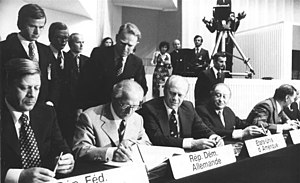| Helsinki Final Act Conference on Security and Co-operation in Europe Final Act | |
|---|---|
 The front page of the Helsinki Accords | |
| Host country | |
| Date | 30 July – 1 August 1975 |
| Venue(s) | Finlandia Hall |
| Cities | Helsinki |
| Participants | |
| Precedes | Paris Charter |


The Helsinki Final Act, also known as Helsinki Accords or Helsinki Declaration, was the document signed at the closing meeting of the third phase of the Conference on Security and Co-operation in Europe (CSCE) held in Helsinki, Finland, between 30 July and 1 August 1975, following two years of negotiations known as the Helsinki Process.[1] All then-existing European countries except Andorra and Hoxhaist Albania, as well as the United States and Canada (altogether 35 participating states), signed the Final Act in an attempt to improve the détente between the East and the West. The Helsinki Accords, however, were not binding as they did not have treaty status that would have to be ratified by parliaments.[2] Sometimes the term "Helsinki pact(s)" was also used unofficially.[3]
- ^ https://www.csce.gov/sites/helsinkicommission.house.gov/files/The%20Helsinki%20Process%20Four%20Decade%20Overview.pdf Archived 2021-08-26 at the Wayback Machine [bare URL PDF]
- ^ Encyclopædia Britannica. Helsinki Accords. Available at: https://www.britannica.com/EBchecked/topic/260615/Helsinki-Accords
- ^ "Helsinki pact: A three-way battle in Madrid". Christian Science Monitor. 9 September 1980.